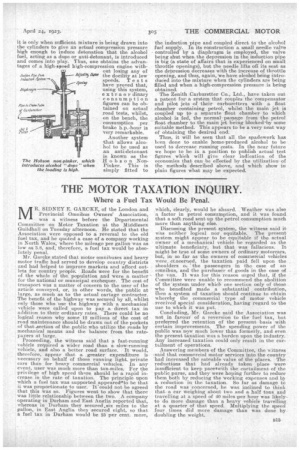THE MOTOR TAXATION INQUIRY.
Page 13

If you've noticed an error in this article please click here to report it so we can fix it.
Where a Fuel Tax Would Be Penal.
MR. SIDNEY E. GARCKE, of the London and Provincial Omnibus Owners' Association, • was a witness before the Departmental Committee on Motor Taxation at the Middlesex Guildhall on Tuesday afternoon. He stated that the Association were opposed to a reversal to the old fuel tax, and he quoted a case of a company working hi North Wales, where the mileage per gallon was as low as 3.8, and, therefore, a fuel tax would be absolutely penal.
Mr. Garcke stated that motor omnibuses and heavy motor traffic had served to develop country districts and had helped to improve markets and afford outlets for country people. Roads were for the benefit of the whole of the population and were a, matter for the national or municipal exchequer. The cost of transport was a matter of concern to the user of the article conveyed, or, in other words, the public at large, as much as to the actual cartage contractor. The benefit of the highway was secured by all, whilst only those who 'use the highway with a mechanical vehicle were called upon to pay a direct tax in addition to their ordinary rates. There conId be no logical reason why some 12 millions of the cost of road maintenance should be drawn out of the pockets of that -section of the public who utilize the roads by mechanical means and the balance from the ratepayers at large. Proceeding, the witness said that a fast-running vehicle required a wider road than a slow-running vehicle, and also a better road surface. It would, therefore, appear that a greater expenditure is necessary on behalf of :those running light, private cars than for heavy commercial vehicles. In any event, user was much more than ton-miles. For the privilege of high speed there should be a rapid increase in the rate of taxation. The principle upon which a fuel tax was supported appeared-'to be that it was proportionate to user. It could not be agreed that this was so. Figures went to show that there was little relationship between the two. A company operating in Durham and East Anglia reported that, whereas in Durham they secured six miles to the gallon, in East Anglia they secured eight, so that a fuel tax in Durham would be 25 per cent. more, ,which, clearly, would be absurd. . Weather was also a factor in petrol consumption, and it was found that a soft road sent up the petrol consumption much more than anything else.
Discussing the present system, the witness said it was neither logical nor equitable. The present system might appear to be equitable if the actual owner of a mechanical vehicle be regarded as the ultimate beneficiary, but that was fallacious. It might be true of some owners of ordinary motorcars, but, in so far as the owners of commercial vehicles were.: ancerned, the taxation paid fell upon the shoulders o the passengers in the case of an omnibus, and the purchaser of goods in the case of the van. It was for this reason urged that, if the Committee were unable to recommend the abolition of the system under which one section only of those who benefited made a substantial contribution, then a system of taxation should continue to obtain whereby the commercial type of motor vehicle received • special consideration,. having regard to the use to which it was put.
Concluding, Mr. Garcke said the Association was not in favour' of a reversion to the fuel tax, but preferred the retention of the present basis with certain 'improvements. The spending power of the public was now much lower than formerly, and even the present taxation was a burden upon the industry. Any increased taxation could only result in the curtailment of operations.
Answering members of the Committee, the witness said that commercial motor services into the country had increased the rateable value of the places. The reductions that had already taken place were insufficient to keep paceSwith the curtailment of public purse, and they were hoping further to reduce them both by reducing the working expenses and by a reduction in the taxation. So far as damage to the road was concerned, he was inclined to think that a car weighing about two and a half tons and travelling at a speed of 40 miles per hour was likelyto do more damage than a heavy vehicle travelling at a quarter of that speed. Multiplying the speed four times did more damage than was done by doubling the weight.






























